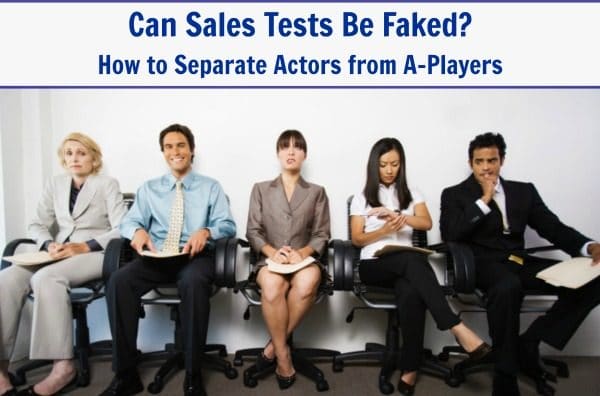
One of the most common questions we receive is whether a sales assessment test can be faked.
This is an important concern, since the purpose of a sales employment screening is to separate the good actors from the high potential candidates.
It is prudent to take a good look into any test before relying on it to screen your candidates.
Unfortunately, many tests are very easy for candidates to quickly size up and fake their way through, creating a false impression of their level of motivation or ambition.
These tests can create even more wasted time and money than if you had not used a test at all.
Learn the key features to look for in an assessment test to successfully screen and hire the right sales reps.
In-Person Interviews
Face-to-face interviews exist partially to help employers determine the character of their applicants. If the phone screen or sales test could not catch an actor, the in-person interview is supposed to fulfill this goal. However, interviews are more challenging than they seem.
A candidate able to bluff his or her way through a sales test is often similarly able to charm an interviewer, making it appear as if he has more skills and experience than what is actually true.
The candidate’s resume will likely reflect similar falsehoods or exaggerations, as lying on resumes is becoming an increasingly more common practice.
Interviews and resumes are easy to navigate for candidates that are good at acting but not as good at closing sales. It is, therefore, the job of the sales assessment to weed out these actors and deliver only the most qualified candidates.
However, many sales tests or personality tests do not get the job done. Candidates know how to assess the test questions and choose the right answers or the questions are simply too easy, allowing them manipulating the test into reporting them as qualified candidates for your sales role.
Finding the Right Sales Test
At SalesDrive we understand how this manipulation occurs, and therefore have designed our own sales personality test – The DriveTest® – to out-maneuver it.
The key to avoiding the problem of actors manipulating aptitude tests is to make sure the questions are written in a challenging format, known as “Forced-Choice” format, where all answers are generally positive and no one answer seems to be the obvious “right” one.
For example, if we simply ask candidates to rate themselves on a 1-5 scale (1- lowest, 5- highest) on the extent to which they are competitive, most will give themselves a “5.” These kinds of questions are easily assessed for the “correct,” aka the most self-flattering, response.
A test with these kinds of questions does little in separating actors from good salespeople. It can even make companies pass on Driven, qualified salespeople, as they assume a good score on the test only means that the candidates know how to test well.
What to Look for with Personality Tests
Some sales personality tests may seek to create a more challenging process by making candidates write in their own responses to questions. However, this approach is not ideal for the following reasons:
1. A good liar is often a good writer. He often just as easily develop a written response as completing simple multiple choice questions.
2. These assessments take much longer to process, requiring human graders rather than just computers.
How The DriveTest Is Different From Other Sales Personality Tests
The DriveTest seeks a more efficient, accurate way of creating challenging questions, which yield accurate results.
By applying a “forced-choice” format, The DriveTest creates challenging test questions that enable us to obtain a more accurate picture of the candidate. We prioritize getting the most precise, useful results to improve your hiring decisions.
Consider the following statement that a candidate must answer:
Choose which of these statements is most like you and which is least like you:
- I enjoy the thrill of competition.
- I focus on staying organized.
- I like meeting new people.
In this case, it is much tougher for a candidate to figure out the answer a company is looking for. All three statements are positive, and the company that the candidate is applying to likely wants its employees to be competitive, organized and sociable.
There is no simple self-flattering choice in this question, forcing the candidate to make some tough distinctions. This gives us a much better sense of his real priorities.
Academic research also supports the principle that forced-choice questions are strongly resistant to faking, not allowing candidates to manipulate the results. Of course, The DriveTest uses this format.
The DriveTest is designed to provide you with the most accurate and useful results about a candidate’s potential as a salesperson. With our forced-choice format and 104 questions, actors will no longer be able to bluff their way onto your sales team.
When researching and deciding on a sales assessment test, it is important to research the kinds of questions that the test will be using. If your test does not use forced-choice questions, it is likely not going to yield the most promising results.
Resumes and interviews can only take you so far when it comes to judging whether or not a candidate will show the Drive necessary to make big sales.
Consider implementing a more comprehensive sales assessment, like The DriveTest, to help your company grow in the right direction.
 Account Login
Account Login




